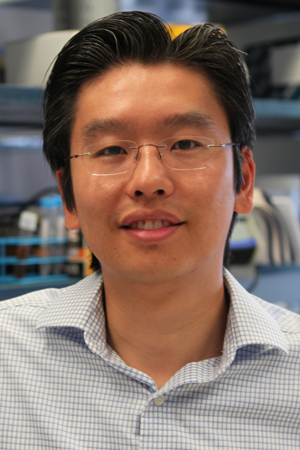News
Harris Wang Named Winner of Sloan Research Fellowship
Harris Wang, an assistant professor in the Columbia University Department of Systems Biology and Department of Pathology and Cell Biology, has been selected to receive a 2015 Alfred P. Sloan Foundation Research Fellowship in computational and evolutionary molecular biology. This two-year, $50,000 grant will support work that combines methods from synthetic biology and computational biology to study how horizontal gene transfer contributes to microbial evolution.
Since 1955, the Sloan Research Fellowship program has supported outstanding early-career scientists in recognition of their achievements and their potential to make important contribution to their fields. This year’s fellows included 126 investigators, with 12 awardees in the field of computational and evolutionary molecular biology. Other disciplines represented in the awards include chemistry, computer science, economics, mathematics, neuroscience, ocean sciences, and physics.
Dr. Wang made his first marks as a graduate student at Harvard University. While there, he invented a technology called MAGE, which provides an efficient method for introducing targeted mutations in E. coli bacteria. He later improved MAGE to edit multiple points in the genome at the same time, and then developed the world’s first automated instrument for directed evolution and genome engineering. This achievement was awarded the grand prize at the 2009 Collegiate Inventors Competition. After joining Columbia in 2013, he followed these achievements with the publication of (MO)-MAGE, a new technology for mutating thousands of genomic targets simultaneously and experimentally investigating how genomes function on a systems-wide level. He has been applying such approaches to explore how microbial populations evolve and interact, with a particular interest in better understanding the large, complex communities of bacteria that inhabit the human gut. (Read an interview about this recent work here.)
In the coming years, Wang plans to build on these accomplishments to develop experimental and computational approaches for understanding how genes and regulatory networks evolve. One area of interest is horizontal gene transfer, a phenomenon in which genetic information is passed between organisms outside of cellular reproduction. Researchers believe that evolutionary pressures determine whether free-floating DNA segments become incorporated into bacterial genomes, based on whether these segments are advantageous within the context of natural selection. However, it is currently unknown exactly how this is determined at the molecular level.
Wang’s work on this topic begins with the hypothesis that compatibility between the genome regulatory networks of the DNA source and DNA recipient is a key determinant of whether loose DNA fragments become integrated into the recipient’s genome. His lab will investigate this by using new high-throughput methods for measuring transcriptional and translational activity of thousands of horizontally acquired regulatory elements. In addition, he hopes to develop a computational framework that would make it possible to predict network compatibility between two organisms based only on their genomic sequences.
Commenting on these future directions, Wang said, “We think this work will not only deepen our understanding of microbial ecology and evolution, but also offer a variety of direct applications for synthetic and systems biology, and be useful for many areas of biotechnology, bioremediation, and medicine. We also think this could help to address public concerns about wide-spread use of mobile DNA in synthetic biology.”
In addition to his Sloan Research Fellowship, Dr. Wang has been recognized as a National Science Foundation Graduate Research Fellow, a National Defense Science and Engineering Graduate Fellow, and a recipient of a National Institutes of Health Early Independence Award and National Science Foundation CAREER Award. In 2012 Forbes magazine also named him among its “30 Under 30” in science.
— Chris Williams
